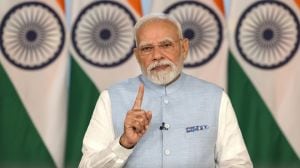He was India’s hope in hockey, he’s 24 but hates the game he loved
NEW DELHI, SEPTEMBER 14: If flowing locks and a bandana helped him stand out from the crowd, his tiger-like speed on the hockey field and ...

NEW DELHI, SEPTEMBER 14: If flowing locks and a bandana helped him stand out from the crowd, his tiger-like speed on the hockey field and goal-scoring ability promised a golden future for Rajiv Mishra. Not exactly a rage, a privilege reserved only for cricketers in the country, Rajiv represented hope for the decaying sport of Indian hockey.
For those gathered at New Delhi’s Indira Gandhi International Airport arrival lounge, awaiting the ’97 Junior World Cup (Milton Keynes in England) silver-medallist Indian colts, Mishra’s was the favourite sound-byte: “My dream is to wear an Olympic gold medal now. We will get that in Sydney,” the man of that tournament, who had pumped in as many as nine goals in the tourney, had said on arrival. The senior team would have loved to just lap him up in their side then.
Alas, Mishra failed to make it to Sydney this time. The frustration in this intense 23-year-old is almost palpable. It is also clear that he wants to completely distance himself from the game. His dream of an Olympic gold is over.
“I am through with the game. I have lost all hope. Frankly, I don’t love this game anymore,” says Mishra, nearly in tears. “What have the officials done for me? Do they know what state I am in now? Nobody is bothered,” he adds. Mishra was first hit by a knee injury in early ’98 and then fell victim to “wrong treatment.”
He has not played hockey since. “I don’t even watch it on TV,” Mishra, who shuttles between his hometown Calcutta and Varanasi, where he works as a TTE in the Northern Railway, fumes. “I am doing some gym just to keep myself fit. That’s all.”
Why is the young man so bitter?
Statistics confirm his was the most satisfying period for Indian hockey in recent years. The junior team, apart from finishing second in the World Cup in ’97, won the Hockey Gold Cup (Bisham Abbey, England) and a Seven-Nation Junior Challenge Cup (Poznan, Poland) and thrashed their German counterparts in a series.
Mishra symbolised whatever hopes India had for a Renaissance in hockey. Seemingly polished and outgoing, he could have helped in upping the marketing of the game and taking it back to the masses. His shooting skills were the envy of his contemporaries, even though some of the best young talent was playing alongside him. The then skipper Baljit Singh Saini, Sameer Dad, Lazarus Barla and Dilip Tirkey have permanent places in the Indian team and are in the Olympic squad too.
Mishra felt the pain in his left knee during the Pakistan team’s tour of India in January-February ’98. Egged on by teammates and supporters alike, he kept playing and it was in the test at Delhi that the injury flared up.
Mishra was advised rest but even as the injury was healing, he was picked for the Utrecht World Cup (May ’98) squad. He couldn’t play in any of the games as the injury was aggravating by mere practice. “It was frustrating. I wanted to play but my knee kept on deteriorating,” Mishra recounts.
He was operated upon in Delhi on his return. “The doctors claimed the operation was successful and I could play again after some time, but I could still feel the pain. For a while nobody listened to me and when I kept insisting that something was wrong, they said I should go to the Sports Authority Centre in Bangalore. There, the Indian Hockey Federation said, the doctors would again examine my knee. I was fed up and scared too. They didn’t even know what was wrong. I couldn’t trust them,” Mishra says.
From then on, Mishra has been leading life in the dark lane. “Recently, I applied for a promotion in the Railways and they rejected it on the basis that I hadn’t played in the past two years. Does that mean all my achievements are a waste now? Players with less to show have superseded me in the organisation,” he said.
Mishra is adamant he won’t play for the Railways or Bengal in the National Championships, if and when he is fit again. “Both the Railways and Bengal have done very little for me. I don’t want to wear their colours.”
There still is some hope for Mishra though. A Calcutta-based organisation, Sapphire Enterprises, has arranged for Mishra’s medical treatment in England.
Photos





- 01
- 02
- 03
- 04
- 05

























